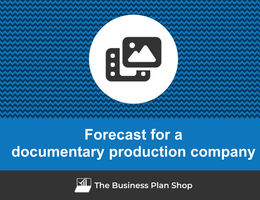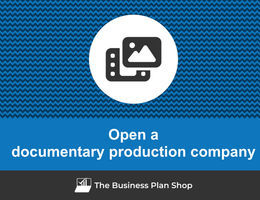How to write a business plan for a documentary production company?
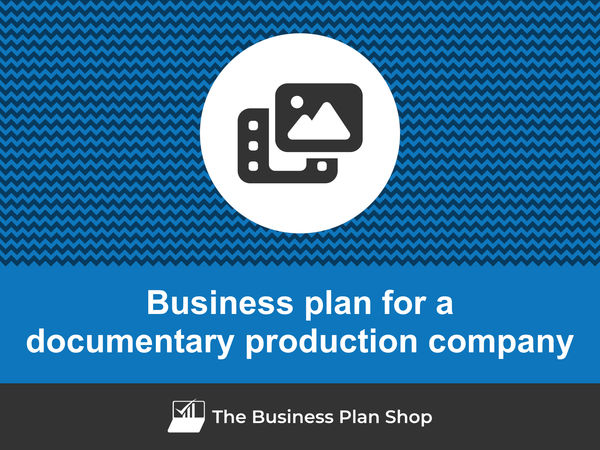
Creating a business plan for a documentary production company is an essential process for any entrepreneur. It serves as a roadmap that outlines the necessary steps to be taken to start or grow the business, the resources required, and the anticipated financial outcomes. It should be crafted with method and confidence.
This guide is designed to provide you with the tools and knowledge necessary for creating a documentary production company business plan, covering why it is so important both when starting up and running an established business, what should be included in your plan, how it should be structured, what tools should be used to save time and avoid errors, and other helpful tips.
We have a lot to cover, so let's get to it!
Why write a business plan for a documentary production company?
Understanding the document's scope and goals will help you easily grasp its structure and content. Before diving into the specifics of the plan, let's take a moment to explore the key reasons why having a documentary production company business plan is so crucial.
To have a clear roadmap to grow the business
It's rarely business as usual for small businesses. The economy follows cycles where years of growth are followed by recessions, and the business environment is always changing with new technologies, new regulations, new competitors, and new consumer behaviours appearing all the time...
In this context, running a business without a clear roadmap is like driving blindfolded: it's dangerous at best. That's why writing a business plan for a documentary production company is essential to create successful and sustainable businesses.
To write an effective business plan, you will need to take stock of where you are (if you are already in business) and where you want the business to go in the next three to five years.
Once you know where you want your documentary production company to be, you'll have to identify:
- what resources (human, equipment, and capital) are needed to get there,
- at what pace the business needs to progress to get there in time,
- and what risks you'll face along the way.
Going through this process regularly is beneficial, both for startups and existing companies, as it helps make informed decisions about how best to allocate resources to ensure the long-term success of the business.
Need a convincing business plan?
The Business Plan Shop makes it easy to create a financial forecast to assess the potential profitability of your projects, and write a business plan that’ll wow investors.

To get visibility on future cash flows
If your small documentary production company runs out of cash: it's game over. That's why we often say "cash is king", and it's crucial to have a clear view of your documentary production company's future cash flows.
So, how can you achieve this? It's simple - you need to have an up-to-date financial forecast.
The good news is that your documentary production company business plan already includes a financial forecast (which we'll discuss further in this guide). Your task is to ensure it stays current.
To accomplish this, it's essential to regularly compare your actual financial performance with what was planned in your financial forecast. Based on your business's current trajectory, you can make adjustments to the forecast.
By diligently monitoring your documentary production company's financial health, you'll be able to spot potential financial issues, like unexpected cash shortfalls, early on and take corrective actions. Moreover, this practice will enable you to recognize and capitalize on growth opportunities, such as excess cash flow enabling you to expand to new locations.
To secure financing
Crafting a comprehensive business plan for your documentary production company, whether you're starting up or already established, is paramount when you're seeking financing from banks or investors.
Given how fragile small businesses are, financiers will want to ensure that you have a clear roadmap in place as well as command and control of your future cash flows before entertaining the idea of funding you.
For banks, the information in your business plan will be used to assess your borrowing capacity - which is defined as the maximum amount of debt your business can afford alongside your ability to repay the loan. This evaluation helps them decide whether to extend credit to your business and under what terms (interest rate, duration, repayment options, collateral, etc.).
Similarly, investors will thoroughly review your plan to determine if their investment can yield an attractive return. They'll be looking for evidence that your documentary production company has the potential for healthy growth, profitability, and consistent cash flow generation over time.
Now that you understand the importance of creating a business plan for your documentary production company, let's delve into the necessary information needed to craft an effective plan.
Need a convincing business plan?
The Business Plan Shop makes it easy to create a financial forecast to assess the potential profitability of your projects, and write a business plan that’ll wow investors.

Information needed to create a business plan for a documentary production company
You need the right data in order to project sales, investments and costs accurately in the financial forecast of your documentary production company business plan.
Below, we'll cover three key pieces of information you should gather before drafting your business plan.
Carrying out market research for a documentary production company
Before you begin writing your business plan for a documentary production company, conducting market research is a critical step in ensuring precise and realistic financial projections.
Market research grants you valuable insights into your target customer base, competitors, pricing strategies, and other crucial factors that can impact the success of your business.
In the course of this research, you may stumble upon trends that could impact your documentary production company.
You may find that viewers of your documentaries could be interested in content that offers a unique perspective on current events. Additionally, viewers might be drawn to documentaries that explore the intersection between different social, cultural, and political issues.
Such market trends play a pivotal role in revenue forecasting, as they provide essential data regarding potential customers' spending habits and preferences.
By integrating these findings into your financial projections, you can provide investors with more accurate information, enabling them to make well-informed decisions about investing in your documentary production company.
Developing the marketing plan for a documentary production company
Before delving into your documentary production company business plan, it's imperative to budget for sales and marketing expenses.
To achieve this, a comprehensive sales and marketing plan is essential. This plan should provide an accurate projection of the necessary actions to acquire and retain customers.
Additionally, it will outline the required workforce to carry out these initiatives and the corresponding budget for promotions, advertising, and other marketing endeavours.
By budgeting accordingly, you can ensure that the right resources are allocated to these vital activities, aligning them with the sales and growth objectives outlined in your business plan.
The staffing and capital expenditure requirements of a documentary production company
Whether you are starting or expanding a documentary production company, it is important to have a clear plan for recruitment and capital expenditures (investment in equipment and real estate) in order to ensure the success of the business.
Both the recruitment and investment plans need to be coherent with the timing and level of growth planned in your forecast, and require appropriate funding.
A documentary production company may incur staffing costs such as paying cast and crew salaries, hiring freelance writers and editors, and providing insurance for their staff. Equipment costs may include purchasing or renting cameras, lighting, sound equipment, and editing software.
In order to create a realistic financial forecast, you will also need to consider the other operating expenses associated with running the business on a day-to-day basis (insurance, bookkeeping, etc.).
Once you have all the necessary information to create a business plan for your documentary production company, it is time to start creating your financial forecast.
Need a convincing business plan?
The Business Plan Shop makes it easy to create a financial forecast to assess the potential profitability of your projects, and write a business plan that’ll wow investors.

What goes into your documentary production company's financial forecast?
The financial forecast of your documentary production company's business plan will enable you to assess the growth, profitability, funding requirements, and cash generation potential of your business in the coming years.
The four key outputs of a financial forecast for a documentary production company are:
- The profit and loss (P&L) statement,
- The projected balance sheet,
- The cash flow forecast,
- And the sources and uses table.
Let's look at each of these in a bit more detail.
The projected P&L statement
Your documentary production company forecasted P&L statement enables the reader of your business plan to get an idea of how much revenue and profits your business is expected to make in the near future.
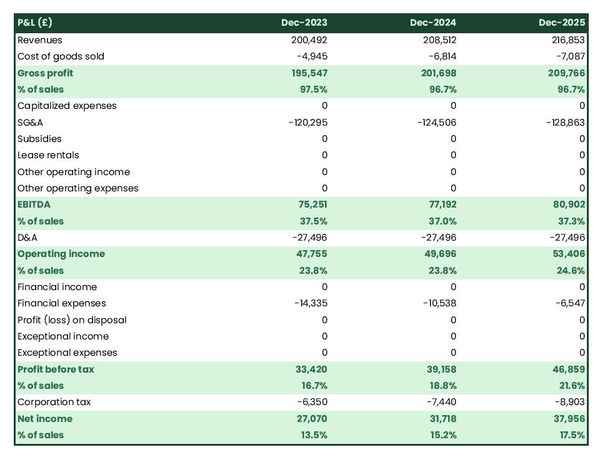
Ideally, your reader will want to see:
- Growth above the inflation level
- Expanding profit margins
- Positive net profit throughout the plan
Expectations for an established documentary production company will of course be different than for a startup. Existing businesses which have reached their cruising altitude might have slower growth and higher margins than ventures just being started.
The forecasted balance sheet of your documentary production company
The projected balance sheet of your documentary production company will enable the reader of your business plan to assess the overall financial health of your business.
It shows three elements: assets, liabilities and equity:
- Assets: are productive resources owned by the business, such as equipment, cash, and accounts receivable (money owed by clients).
- Liabilities: are debts owed to creditors, lenders, and other entities, such as accounts payable (money owed to suppliers).
- Equity: includes the sums invested by the shareholders or business owners and the profits and losses accumulated by the business to date (which are called retained earnings). It is a proxy for the value of the owner's stake in the business.
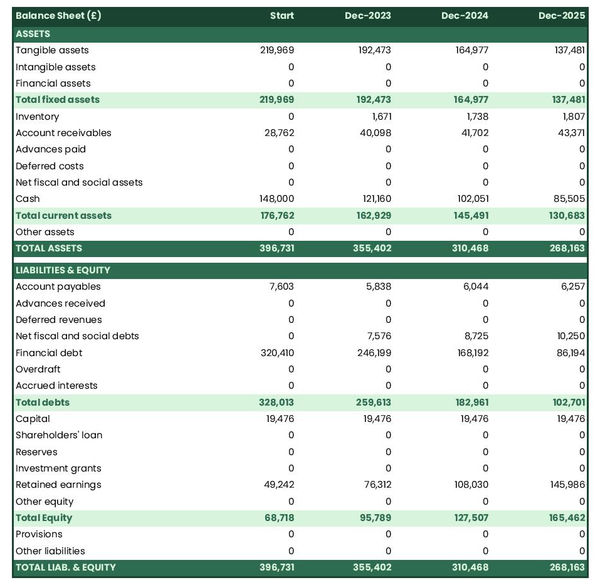
Analysing your documentary production company projected balance sheet provides an understanding of your documentary production company's working capital structure, investment and financing policies.
In particular, the readers of your plan can compare the level of financial debt on the balance sheet to the equity value to measure the level of financial risk (equity doesn't need to be reimbursed, while financial debt must be repaid, making it riskier).
They can also use your balance sheet to assess your documentary production company's liquidity and solvency:
- A liquidity analysis: focuses on whether or not your business has sufficient cash and short-term assets to cover its liabilities due in the next 12 months.
- A solvency analysis: takes and longer view to assess whether or not your business has the capacity to repay its debts over the medium-term.
The projected cash flow statement
A cash flow forecast for a documentary production company shows how much cash the business is projected to generate or consume.
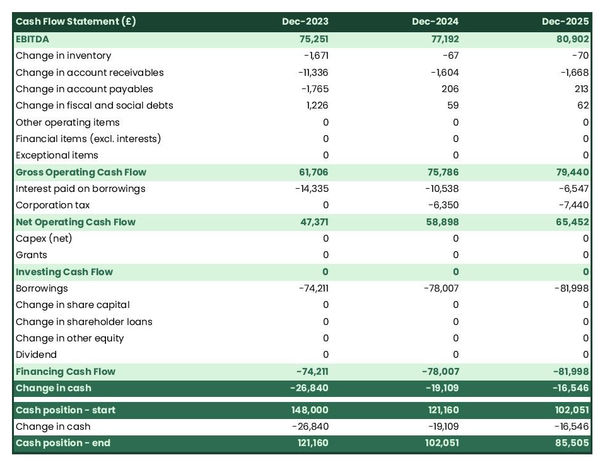
The cash flow statement is divided into 3 main areas:
- The operating cash flow shows how much cash is generated or consumed by the operations (running the business)
- The investing cash flow shows how much cash is being invested in capital expenditure (equipment, real estate, etc.)
- The financing cash flow shows how much cash is raised or distributed to investors and lenders
Looking at the cash flow forecast helps you to ensure that your business has enough cash to keep running, and can help you anticipate potential cash shortfalls.
It is also a best practice to include a monthly cash flow statement in the appendices of your documentary production company business plan so that the readers can view the impact of seasonality on your business cash position and generation.
The initial financing plan
The initial financing plan - also called a sources and uses table - is an important tool when starting a documentary production company.
It shows where the money needed to set up the business will come from (sources) and how it will be allocated (uses).

Having this table helps understand what costs are involved in setting up the documentary production company, how the risks are distributed between the shareholders and the lenders, and what will be the starting cash position (which needs to be sufficient to sustain operations until the business breaks even).
Now that the financial forecast of a documentary production company business plan is understood, let's focus on what goes into the written part of the plan.
Need a convincing business plan?
The Business Plan Shop makes it easy to create a financial forecast to assess the potential profitability of your projects, and write a business plan that’ll wow investors.

The written part of a documentary production company business plan
The written part of a documentary production company business plan plays a key role: it lays out the plan of action you intend to execute to seize the commercial opportunity you've identified on the market and provides the context needed for the reader to decide if they believe your plan to be achievable and your financial forecast to be realistic.
The written part of a documentary production company business plan is composed of 7 main sections:
- The executive summary
- The presentation of the company
- The products and services
- The market analysis
- The strategy
- The operations
- The financial plan
Let's go through the content of each section in more detail!
1. The executive summary
The executive summary, the first section of your documentary production company's business plan, serves as an inviting snapshot of your entire plan, leaving readers eager to know more about your business.
To compose an effective executive summary, start with a concise introduction of your business, covering its name, concept, location, history, and unique aspects. Share insights about the services or products you intend to offer and your target customer base.
Subsequently, provide an overview of your documentary production company's addressable market, highlighting current trends and potential growth opportunities.
Then, present a summary of critical financial figures, such as projected revenues, profits, and cash flows.
You should then include a summary of your key financial figures such as projected revenues, profits, and cash flows.
Lastly, address any funding needs in the "ask" section of your executive summary.
2. The presentation of the company
The second section in your documentary production company's business plan should focus on the structure and ownership, location, and management team of the company.
The structure and ownership part provides an overview of the legal structure of the business, who the owners are and how much each has invested and owns. If you are seeking financing it is important that the reader gets a clear picture of which legal entity is receiving the funds, and who controls the business.
The location part should give an overview of the premises from which the company is operating, and why that location is of particular interest (catchment area, accessibility, amenities nearby, etc.).
When describing the location of your documentary production company, you may emphasize the potential for access to diverse stories and perspectives. The area could offer access to a wide range of people, cultures, and stories that could be explored in a compelling way. Additionally, the location could provide access to a variety of filming locations, allowing the production company to capture a variety of visuals that could be used to enhance the documentary's production value. The area may also provide access to a wide range of talented professionals with the skills and experience needed to bring the documentary to life.
Finally, you should introduce the management team. Explain each member's role, background, and experience.
It is also important to emphasize any past successes that the members of the management team have achieved, and how long they've been working together, as this will help potential lenders or investors understand why they should trust in their leadership.
3. The products and services section
The products and services section of your documentary production company business plan should include a detailed description of what your company sells to its customers.
For example, your documentary production company might offer script writing services to bring the customer's story to life, pre-production services such as research and planning, and post-production services including editing and motion graphics to create a polished film. These services work together to develop an engaging documentary that meets the customer's needs and can be distributed across multiple channels.
The reader will want to understand what makes your documentary production company unique from other businesses in this competitive market.
When drafting this section, you should be precise about the categories of products or services you sell, the clients you are targeting and the channels that you are targeting them through.
4. The market analysis
When you present your market analysis in your documentary production company business plan, it's crucial to include detailed information about customers' demographics and segmentation, target market, competition, barriers to entry, and any relevant regulations.
The main objective of this section is to help the reader understand the size and attractiveness of the market while demonstrating your solid understanding of the industry.
Begin with the demographics and segmentation subsection, providing an overview of the addressable market for your documentary production company, the key trends in the marketplace, and introducing different customer segments along with their preferences in terms of purchasing habits and budgets.
Next, focus on your target market, zooming in on the specific customer segments your documentary production company aims to serve and explaining how your products and services fulfil their distinct needs.
For example, your target market might include people who are passionate about learning and exploring new topics. These people tend to be interested in documentary films because they help them to understand complex topics in a more accessible way. Additionally, these individuals are likely to be financially well-off, as documentaries are often seen as a luxury item.
Then proceed to the competition subsection, where you introduce your main competitors and highlight what sets you apart from them.
Finally, conclude your market analysis with an overview of the key regulations applicable to your documentary production company.
Need a convincing business plan?
The Business Plan Shop makes it easy to create a financial forecast to assess the potential profitability of your projects, and write a business plan that’ll wow investors.

5. The strategy section
When you write the strategy section of your documentary production company business plan, remember to cover key elements such as your competitive edge, pricing strategy, sales & marketing plan, milestones, and risks and mitigants.
In the competitive edge subsection, elaborate on what makes your company stand out from competitors. This becomes especially important if you're a startup, aiming to carve a place for yourself amidst established players in the marketplace.
The pricing strategy subsection should demonstrate how you plan to maintain profitability while offering competitive prices to attract customers.
Outline your sales & marketing plan, detailing how you'll reach out to new customers and retain existing ones through loyalty programs or special offers.
For the milestones subsection, outline your company's achievements to date and your main objectives for the future, complete with specific dates to set clear expectations for progress.
Lastly, the risks and mitigants subsection should address the main risks that could affect your plan's execution. Explain the measures you've put in place to minimize these risks, assuring potential investors or lenders.
Your documentary production company could face business-related risks, such as changes in the industry, or a lack of production funding. For example, the documentary industry may become oversaturated, leaving your company with fewer projects to pursue. Additionally, your company could struggle to secure funding for the production of your films; if a large backer pulls out, you may be forced to delay or cancel a project.
6. The operations section
The operations of your documentary production company must be presented in detail in your business plan.
Begin by addressing your staff, specifying the main roles and your recruitment plan to support the anticipated growth. Outline the qualifications and experience needed for each role and discuss your recruitment strategies, which may involve using job boards, referrals, or headhunters.
Next, clearly state your documentary production company's operating hours, allowing the reader to gauge the adequacy of your staffing levels. Additionally, mention any considerations for varying opening times during peak seasons and your approach to handling customer queries outside regular operating hours.
The key assets and intellectual property (IP) required to run your business should also be highlighted. If you rely on licenses, trademarks, physical structures like equipment or property, or lease agreements, ensure they are well-documented in this section.
You may have key assets such as footage or photographs that are specific to your documentary production company. These could be interviews with key figures, or scenes that are unique to the project. Additionally, you might have intellectual property that is specific to your documentary production company, such as scripts, storyboards, and other creative works associated with the production.
Finally, provide a comprehensive list of suppliers you intend to collaborate with, along with a breakdown of their services and main commercial terms, such as price, payment terms, break clauses and contract duration. Investors often seek insight into the reasons behind your supplier choices, which may include a preference for higher-quality products or established relationships from past ventures.
7. The presentation of the financial plan
The financial plan section is where we will include the financial forecast we talked about earlier in this guide.
Now that you have a clear idea of the content of a documentary production company business plan, let's look at some of the tools you can use to create yours.
Need a convincing business plan?
The Business Plan Shop makes it easy to create a financial forecast to assess the potential profitability of your projects, and write a business plan that’ll wow investors.

What tool should I use to write my documentary production company's business plan?
There are two main ways of creating your documentary production company business plan:
- Using specialized business planning software,
- Hiring a business plan writer.
Using an online business plan software for your documentary production company's business plan
Using online business planning software is the most efficient and modern way to create a documentary production company business plan.
There are several advantages to using specialized software:
- You can easily create your financial forecast by letting the software take care of the financial calculations for you without errors
- You are guided through the writing process by detailed instructions and examples for each part of the plan
- You can access a library of dozens of complete business plan samples and templates for inspiration
- You get a professional business plan, formatted and ready to be sent to your bank or investors
- You can easily track your actual financial performance against your financial forecast
- You can create scenarios to stress test your forecast's main assumptions
- You can easily update your forecast as time goes by to maintain visibility on future cash flows
- You have a friendly support team on standby to assist you when you are stuck
If you're interested in using this type of solution, you can try The Business Plan Shop for free by signing up here.
Hiring a business plan writer to write your documentary production company's business plan
Outsourcing your documentary production company business plan to a business plan writer can also be a viable option.
Business plan writers are experienced in writing business plans and adept at creating financial forecasts without errors. Furthermore, hiring a consultant can save you time and allow you to focus on the day-to-day operations of your business.
However, hiring business plan writers is expensive as you are paying for the software used by the consultant, plus their time, and their profit margin of course.
From experience, you need to budget at least £1.5k ($2.0k) excluding tax for a complete business plan, more if you need to make changes after the initial version (which happens frequently after the initial meetings with lenders or investors).
You also need to be careful when seeking investment. Investors want their money to be used to grow the business, not spent on consulting fees. Therefore, the amount you spend on business plan writing services (and other consulting services such as legal services) needs to be negligible relative to the amount raised.
The other drawback is that you usually don't own the business plan itself: you just get the output, while the actual document is saved in the consultant's business plan software - which makes it difficult to maintain the document up to date without hiring the consultant on a retainer.
For these reasons, outsourcing the documentary production company business plan to a business plan writer should be considered carefully, weighing both the advantages and disadvantages of hiring outside help.
Ultimately, it may be the right decision for some businesses, while others may find it beneficial to write their business plan using online software.
Need a convincing business plan?
The Business Plan Shop makes it easy to create a financial forecast to assess the potential profitability of your projects, and write a business plan that’ll wow investors.

Why not create your documentary production company's business plan using Word or Excel?
I must advise against using Microsoft Excel and Word (or their Google, Apple, or open-source equivalents) to write your documentary production company business plan. Let me explain why.
Firstly, creating an accurate and error-free financial forecast on Excel (or any spreadsheet) is highly technical and requires a strong grasp of accounting principles and financial modelling skills. It is, therefore, unlikely that anyone will fully trust your numbers unless you have both a degree in finance and accounting and significant financial modelling experience, like us at The Business Plan Shop.
Secondly, relying on spreadsheets is inefficient. While it may have been the only option in the past, technology has advanced significantly, and software can now perform these tasks much faster and with greater accuracy. With the rise of AI, software can even help us detect mistakes in forecasts and analyze the numbers for better decision-making.
And with the rise of AI, software is also becoming smarter at helping us detect mistakes in our forecasts and helping us analyse the numbers to make better decisions.
Moreover, software makes it easier to compare actuals versus forecasts and maintain up-to-date forecasts to keep visibility on future cash flows, as we discussed earlier in this guide. This task is cumbersome when using spreadsheets.
Now, let's talk about the written part of your documentary production company business plan. While it may be less error-prone, using software can bring tremendous gains in productivity. Word processors, for example, lack instructions and examples for each part of your business plan. They also won't automatically update your numbers when changes occur in your forecast, and they don't handle formatting for you.
Overall, while Word or Excel may seem viable for some entrepreneurs to create a business plan, it's by far becoming an antiquated way of doing things.
Takeaways
- A business plan has 2 complementary parts: a financial forecast showcasing the expected growth, profits and cash flows of the business; and a written part which provides the context needed to judge if the forecast is realistic and relevant.
- Having an up-to-date business plan is the only way to keep visibility on your documentary production company's future cash flows.
- Using business plan software is the modern way of writing and maintaining business plans.
We hope that this practical guide gave you insights on how to write the business plan for your documentary production company. Do not hesitate to get in touch with our team if you still have questions.
Also on The Business Plan Shop
- In-depth business plan structure
- Do i need a business plan?
- How to present your business location in a business plan
- How to write the products and services section of your business plan
- Key steps to write a business plan?
- Free business plan template
Know someone who owns or wants to start a documentary production company? Share this article with them!


